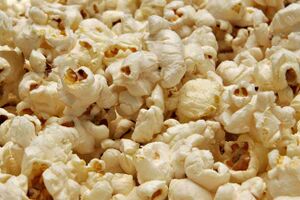Puffed grain: Difference between revisions
Klapaucius (talk | contribs) m (Text replace - "{|cellspacing=3 |-valign="top" |width="100%" bgcolor="#FAF5FF" style="border-style:solid;border-width:1px;padding:1em;padding-top:0;"| <div style="float:right;margin-left:0.9em">" to "") |
No edit summary |
||
| Line 1: | Line 1: | ||
< | <!-- seo --> | ||
{{#seo: | |||
|title=Puffed grain: Cooking Wiki | |||
|titlemode=replace | |||
|keywords=#puffedgrain #rice #wheat #soybeans #batter #corn #makhana #nutsgrainsandseeds #popcorn #sweetcorn #amaranth | |||
|hashtagrev=12032020 | |||
|description=Puffed grain includes ancient puffed grains like popcorn as well as puffed rice | |||
}} | |||
<!-- /seo --> | |||
[[Image:Popcorn.jpg|300px|thumb|right|Popcorn]] | [[Image:Popcorn.jpg|300px|thumb|right|Popcorn]] | ||
'''Puffed [[grain]]''' includes ancient puffed grains like [[popcorn]] as well as puffed [[rice]]. Modern puffed grains are often created using high pressure. | '''Puffed [[grain]]''' includes ancient puffed grains like [[popcorn]] as well as puffed [[rice]]. Modern puffed grains are often created using high pressure. | ||
| Line 5: | Line 15: | ||
High pressure puffed grain is created by placing whole grains under high pressure with steam. When the containment vessel's seal is suddenly broken, the entrained steam then flashes and bloats the endosperm of the kernel, increasing its volume to many times its original size. | High pressure puffed grain is created by placing whole grains under high pressure with steam. When the containment vessel's seal is suddenly broken, the entrained steam then flashes and bloats the endosperm of the kernel, increasing its volume to many times its original size. | ||
Puffed rice or other grains are occasionally found as street food in China, Korea , and Japan, where | Puffed rice or other grains are occasionally found as street food in China, Korea , and Japan, where pedlars implement the puffing process using an integrated pushcart/puffer featuring a rotating steel pressure chamber heated over an open flame. The great booming sound produced by the release of pressure serves as advertising to attract customers. | ||
One aspect of puffing is its simplicity. For instance, the ingredients for puffed rice can be just rice and perhaps salt for taste. Other products like Rice Krispies or Corn Pops mix many ingredients into a homogeneous [[batter]]. The [[batter]] is then formed into kernel shapes and toasted. This causes them to rise, but not puff or pop. | One aspect of puffing is its simplicity. For instance, the ingredients for puffed rice can be just rice and perhaps salt for taste. Other products like Rice Krispies or Corn Pops mix many ingredients into a homogeneous [[batter]]. The [[batter]] is then formed into kernel shapes and toasted. This causes them to rise, but not puff or pop. | ||
Puffed grains are popular as breakfast cereals and in the form of "rice cakes". While it is easy to | Puffed grains are popular as breakfast cereals and in the form of "rice cakes". While it is easy to recognise that the cereals came from whole grains, the expansion factor for rice cakes is even greater, and the final product is somewhat more homogeneous. | ||
Grains that can be puffed include: | Grains that can be puffed include: | ||
| Line 37: | Line 47: | ||
* Yuba ([[soy beans]]) | * Yuba ([[soy beans]]) | ||
{{CategoryLineIngredients}} | |||
[[Category:Ingredients]] | [[Category:Ingredients]] | ||
[[Category:Nuts grains and seeds]] | [[Category:Nuts grains and seeds]] | ||
<!-- footer hashtags --><code 'hashtagrev:12032020'>[[Special:Search/puffedgrain|#puffedgrain]] [[Special:Search/rice|#rice]] [[Special:Search/wheat|#wheat]] [[Special:Search/soybeans|#soybeans]] [[Special:Search/batter|#batter]] [[Special:Search/corn|#corn]] [[Special:Search/makhana|#makhana]] [[Special:Search/nutsgrainsandseeds|#nutsgrainsandseeds]] [[Special:Search/popcorn|#popcorn]] [[Special:Search/sweetcorn|#sweetcorn]] [[Special:Search/amaranth|#amaranth]] | |||
</code><!-- /footer hashtags --> | |||
Latest revision as of 17:01, 14 August 2014

Puffed grain includes ancient puffed grains like popcorn as well as puffed rice. Modern puffed grains are often created using high pressure.
High pressure puffed grain is created by placing whole grains under high pressure with steam. When the containment vessel's seal is suddenly broken, the entrained steam then flashes and bloats the endosperm of the kernel, increasing its volume to many times its original size.
Puffed rice or other grains are occasionally found as street food in China, Korea , and Japan, where pedlars implement the puffing process using an integrated pushcart/puffer featuring a rotating steel pressure chamber heated over an open flame. The great booming sound produced by the release of pressure serves as advertising to attract customers.
One aspect of puffing is its simplicity. For instance, the ingredients for puffed rice can be just rice and perhaps salt for taste. Other products like Rice Krispies or Corn Pops mix many ingredients into a homogeneous batter. The batter is then formed into kernel shapes and toasted. This causes them to rise, but not puff or pop.
Puffed grains are popular as breakfast cereals and in the form of "rice cakes". While it is easy to recognise that the cereals came from whole grains, the expansion factor for rice cakes is even greater, and the final product is somewhat more homogeneous.
Grains that can be puffed include:
Non-grains that can be puffed include:
Snacks and food products made from puffed grain include:
- Bhelpuri (rice)
- Cheese puffs (corn)
- Golden Crisp (wheat)
- Kix (breakfast cereal)
- Puffed rice (rice)
- Smacks (wheat)
- Toffee Crisp (rice)
- Wotsits (corn)
- Yuba (soy beans)
Find recipes that contain 'Puffed grain'
#puffedgrain #rice #wheat #soybeans #batter #corn #makhana #nutsgrainsandseeds #popcorn #sweetcorn #amaranth